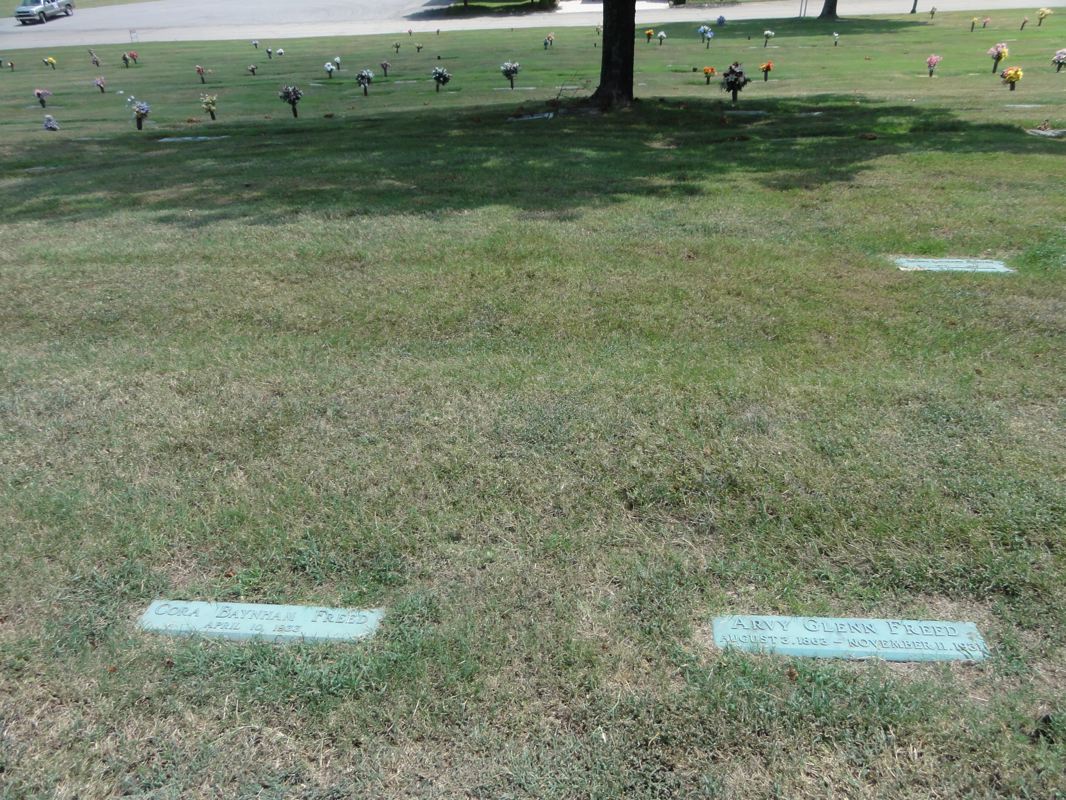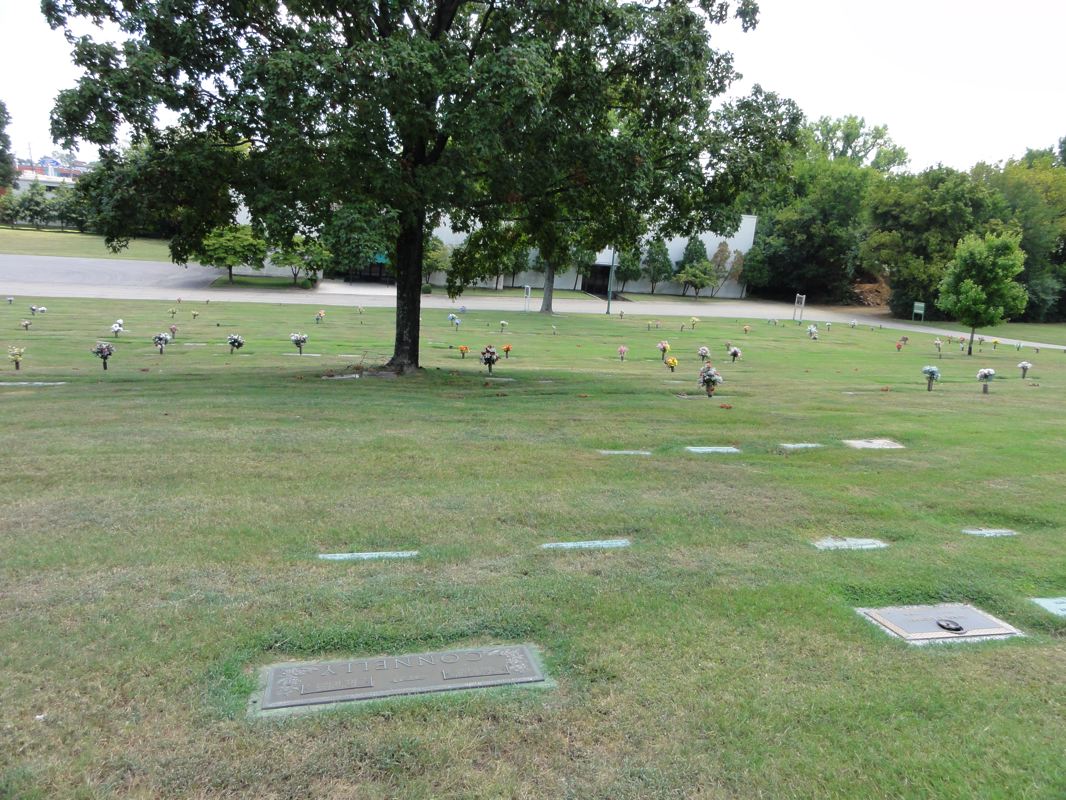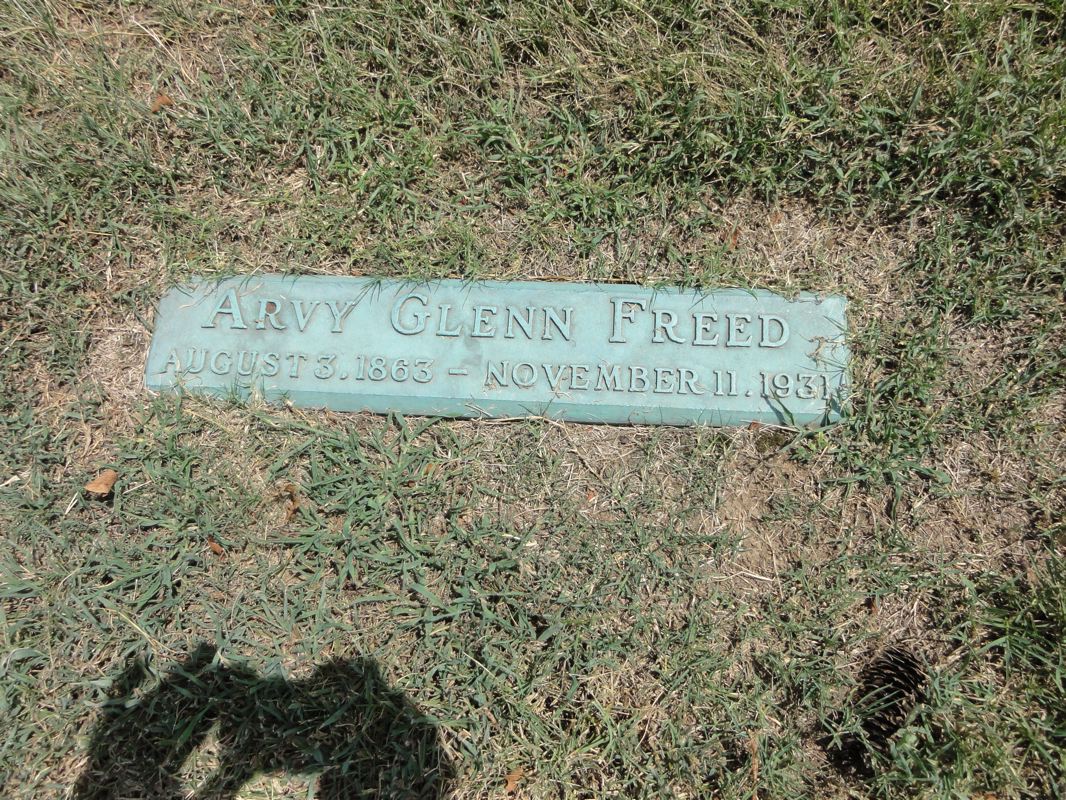Arvy Glenn Freed
1863-1931
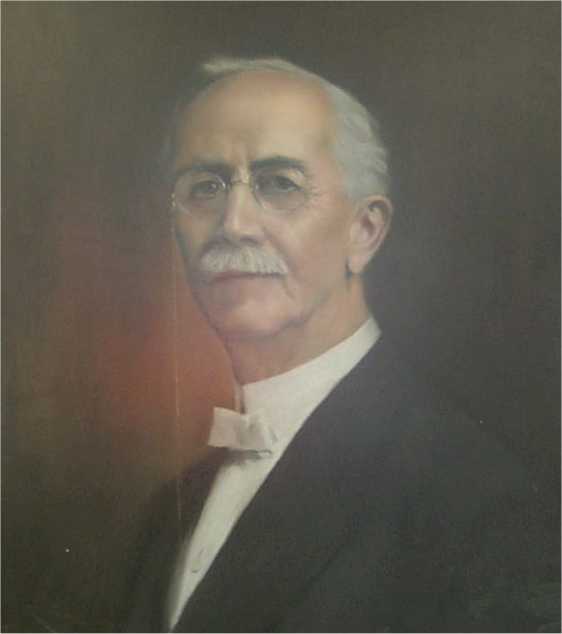
![]()
Biographical Sketch Of The Life Of A.G. Freed
On August 3, 1863, in Indiana, Arvy Glenn Freed was born. His parents were Joseph and Elisa Hayes Freed. At the time of Brother Freed's birth Joseph Freed lived in Saltillo, Indiana. His mother was a Hayes, a relative of President Rutherford B. Hayes. Brother Freed had some distinguished ancestors. He was educated in the common schools of Indiana until he was ready to go to college. He entered Valparaiso University and was graduated with distinction from that famous educational institution. Brother Freed had strong intellectual powers, together with a keen intellect. He easily mastered any subject which he set his heart to study.
He became a Christian early in life. Soon after becoming a Christian he began to preach the gospel. He combined teaching and preaching. After graduating from the university he came to Tennessee and dedicated his life to the cause of Christian education and the preaching of the gospel. He had laid well the foundation for a thorough education and had mastered every branch that belonged to the curriculum for his day. He established a school at Essary Springs, Tenn., and there enjoyed the first success of his successful career as an educator. After teaching a number of years at Essary Springs, he went to Henderson, Tenn., and there began work in a larger field. He gathered around him a very efficient faculty of teachers, and his college soon became famous throughout West Tennessee and North Mississippi. The institution at Henderson grew, and its courses were modified to keep apace with the onward March of the cause of education. Brother Freed went to Texas and taught a few years, but returned to his old field of labor at Henderson and established what is now known as Freed-Hardeman College. He remained with this institution of learning until 1923. At that time he came to Nashville and accepted the position of vice president of David Lipscomb College. He remained with this college until he passed away. Brother Freed may be classed among the famous educators of the South.
In the pulpit, as a preacher of the gospel, he achieved great success. He understood the Bible and loved the word of God. He delighted in studying its sacred truths. His sermons were logical and Scriptural. He presented his lessons with kindness and persuasiveness. He could present the truth in such a way as to convince the disbeliever and persuade and encourage all to accept the word of God. He was very successful as an evangelist and baptized hundreds of people. He established many congregations and strengthened many others. He traveled and preached in nearly all of the Southern States and many of the Northern States. His services were always in demand, and he never found time to rest. Thousands of people living today can rejoice in the fact that Brother Freed helped them to see the truth and then to accept it.
In
the field of polemics Brother Freed bad but few equals and possibly no
superiors. Brother Freed was not militant in nature, neither was he
inclined to disputing. He debated because he saw the need of discussion,
and was not afraid to defend the church or the truth of God as revealed in
the Bible against any opposition. No man bad greater courage when armed
with the truth than did A. G. Freed, and no man wrought greater victories
for the truth in discussion than did Brother Freed. He was kind, but
emphatic, in his discussion. His great love for the truth of God led him
to have no mercy on error. The church of our Lord in many places has
rejoiced through the victories won in discussion by Brother Freed.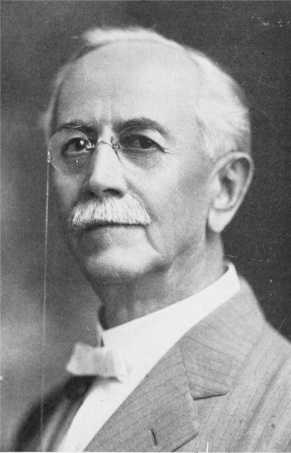
A. G. Freed was a great man. He served his fellow man as a teacher and as a preacher of the gospel. Many young men and young women owe their success, in a large measure, to the help and encouragement which Brother Freed gave them. Brother Freed's greatness is not to be measured by the ordinary standards of man; his greatness is to be measured by the good that he did. No man can be truly good without being great, and no man can be truly great without being good. Brother Freed was a good man, and, therefore, a great man. If we should measure his greatness by the number of people that he has helped, it would be difficult to find a greater man than A. G. Freed. He encouraged and inspired thousands of young men and young women to aspire to a nobler life in the service of man and of God. He started hundreds of gospel preachers to work in the vineyard of the Lord and trained them for the greatest usefulness as preachers of the gospel. The cause of Christ and Christian education in the South have made greater progress because of the consecration and labors of Brother Freed.
Brother Freed was an educated, Christian gentleman. He was gentle in nature; he had a poetic nature; he loved poetry and music. He was humble and kind; few could excel him in gentleness and kindness. It seems that he was a very Chesterfield in courtesy. He had the polish that graces one in society and makes one a charming companion and friend. He was loyal to the right and to his friends. The writer has been blessed by the close association of three great men: David Lipscomb, E. A. Elam, and A. G. Freed. The writer has labored years with each of these great men and has received rich blessings through close association with them. From D. Lipscomb the writer learned the rugged truths of the Bible and received encouragement which strengthened his faith in the word of God; through the association with E.A. Elam he learned to appreciate more the value of loyalty to the word of God and service in the name of Christ; and through the association with Brother Freed he learned some of those finer graces of soul culture which adorn the Christian life. He thanks God for the influence of these three great men.
Brother Freed's last days were spent in suffering, but without complaint. His conflict with death, as it respected bodily affliction, was truly hard; but his soul appeared to be happy in the conflict. No one ever witnessed such resignation and Christian fortitude as was displayed by Brother Freed. He was reduced in flesh and must have experienced great pain, but no murmur or complaint was ever heard from his lips. On the contrary, when asked how he was, be always replied that be was doing well.
He never lost that gracious smile which had adorned his life. On November 11, 1931, his peaceful spirit left his emaciated body and went to Him who gave it. He passed away as he had lived, hopeful and peaceful. Human society is richer and better because Brother Freed has lived.
-From Biographical Sketches Of Gospel Preachers, H. Leo Boles, Gospel Advocate Company, Nashville, Tennessee, 1932, pages 448-451
![]()
A. G. FREED
Arvy Glenn Freed was born at Saltillo, Indiana in August 3, 1863. He attended local public schools and then Valparaiso University, Valparaiso, Indiana, graduating there in 1889. After graduation he came south and began a teaching, preaching, and debating career at Essary Springs, Tennessee in the fall of 1889.
Essary Springs, where he started his work in Christian Education in the South is on Big Hatchie River in the southeast corner of Hardeman County. Southern Tennessee Normal College, as the school there was named, began in 1889 with Freed as President and continued until 1895. He built it to an enrollment of about 450 students.
While at Essary Springs, he met and married Cora Belle Baynham of LaFayette, Kentucky. To this union two children were born. One, a son, Arvy Baynham died very young and the other, Martha Belle Freed Primme now resides in New York City.
In 1895 the board of trustees of West Tennessee Christian College, a school in Henderson, Tennessee that had been in operation for some years, offered to unite the two schools and Freed accepted. He did so under the provision that the trustees would grant him a lease of ten years to run the school. Two years later, in 1897, a new brick administration building was erected and the name of the school was changed to Georgie Robertson Christian College. A period of great growth followed and Brother Freed asserted in 1901 that it was "the largest and best equipped normal school south of the Ohio River."
Due to dissension in the faculty of G.R.C. College, Brother Freed resigned and went to Denton, Texas at the end of his lease in 1905. He became President of Southwestern Christian College and remained there until 1908. He returned to Henderson on that date to become co-founder with N. B. Hardeman of National Teachers Normal and Business College. He was President and Hardeman Vice-President most of the period from 1908 until 1923. In 1923 he sold his interest in Freed-Hardeman College, (the name of the school having been changed in 1919), and moved to Nashville, Tennessee to become Vice-President of David Lipscomb College, where he remained until his death in 1931.
During the many years of administrative responsibility in these five colleges he had been most active as a preacher, lecturer, and debater throughout the South. He was a Bible scholar and natural teacher. He inspired young people wherever he went to attend college and through his own magnetic personality, keen thinking, and impressive demeanor, sent them from the college halls with a store of knowledge and a purpose in life.
He met and defeated the giant leaders of denominations in the area. Among these was Bogard, Baptist in Little Rock, Arkansas, seven debates with Pigue, Methodist, in Tennessee and Mississippi, two with J. N. Hall, Baptist, and one with Taylor, Baptist, in Jackson, Tennessee in 1927.
In a volume, "Sermons, Chapel Talks, and Debates," published by I. A. Douthitt in 1930, there is the following tribute; "Brother A. G. Freed has been one of the leading educators of the South for more than a third of a century, and the greater portion of his labors, both as President of colleges and preacher of the gospel, has been done in West Tennessee. This fact alone tells more eloquently than I am able to do the character of man he is. During all this time he has been and is now one of the greatest preachers and debaters in the church of Christ."
In a memorial service in the chapel of Freed-Hardeman College on November 17, 1931, L. L. Brigance said; "Industry was Brother Freed's outstanding characteristic, his other attributes however, optimism, courtesy, dignity, cleanliness, and love of home being of such strength in the man's make-up as to stand on a par with the first mentioned."
A. B. Lipscomb of Valdosta, Georgia said; "At one place and another wherever I go, I meet young men who have sat at Brother Freed's feet and into whose lives something of his noble character has been woven. When they lead in prayer I catch the teacher's phrase, `just over there' and now let us rejoice in the fact that Brother Freed knows what it means to be `just over there'."
-C. P. Roland, Freed-Hardeman College, Henderson, Tennessee.
-The Minister's Monthly - Volume XI, No. 5, January, 1966
![]()
Passing Of Brother Freed
No death of recent years has been more keenly nor occasioned more universal regret than the recent passing of Brother A.G. Freed. Brother Freed died November 12, 1931, at the Vanderbilt Hospital, Nashville, Tenn., after a very severe illness. As he was being carried to the operating room, he repeated these touching words: "Though I walk through the valley of the shadow of death, I will fear no evil: for thou art with me; they rod and they staff they comfort me." Funeral services were conducted in the auditorium of the Central Church of Christ on Friday, November 13, after which his body was buried in beautiful Woodlawn Cemetery, Nashville, to await the resurrection morning.
Brother Freed is survived by his wife, Cora Baynham Freed, and one daughter, Mrs. James Barnes, of Jacksonville, Ill.; one brother, A.L. Freed, of Campbellsburg, Ind.; two sisters, Mrs. L.B. Mather, of Anderson, Ind., and Mrs. J.A. Matthew, of Macon, Ga.
For many years Brother Freed was one of the outstanding educators of the South. He came South many years ago and established a school at Essary Springs, Tenn., after the successful operation of which he removed to Henderson, Tenn., where he became President of the West Tennessee Christian College, later known as the Georgia Robertson Christian College. Upon urgent solicitation he went to Denton, Texas, and founded the Southwestern Christian College. Upon returning to Tennessee, he reorganized the school at Henderson, which, for so many years, has been known as the Freed-Hardeman College. Having severed his connection with the Freed-Hardeman College, at Henderson, Tenn., about nine years ago, he became vice-president, and also head of the high school department of David-Lipscomb College, at Nashville, Tenn.
Brother Freed was well and widely known as a preacher of the gospel. By his preaching, writing, and in debates he did much for the advancement of Bible Christianity. For many years he most successfully met the strongest men the denomination could put up and delighted truth lovers with his able defense of the teaching of the Bible. Many think that the noted J.N. Hall, who was generally conceded to be the strongest man in the Baptist Church of his generation, felt so much chagrin after his debate with Brother Freed that he was not the same man again. In recent years Brother Freed delighted Nashville audiences by his able defense of the truth in an eleven-session debated with Ben M. Bogard, held at Lindsley Avenue, Nashville, Tenn.
In 1939, Brother Freed published his book, entitled "Sermons, Chapel Talks, and Debates." We are thankful that he did not wait too late too late to publish this splendid volume. It should be in every home. In it Brother Freed, gives choice selections from chapel talks made to students, sermons he has preached, and arguments the presented in debate.
When loved ones pass it is glorious to think of the comfort and consolation to children of God in the Scriptures: "And I heard a voice from heaven saying unto me, Write, Blessed are the dead which die in the Lord from henceforth: Yea, saith the Spirit, that they may rest from their labors; and their works do follow them." - (Rev. 14:13.).
-James A. Allen, Apostolic Times, Vol. 1, No. 5, December, 1931, page 5
![]()
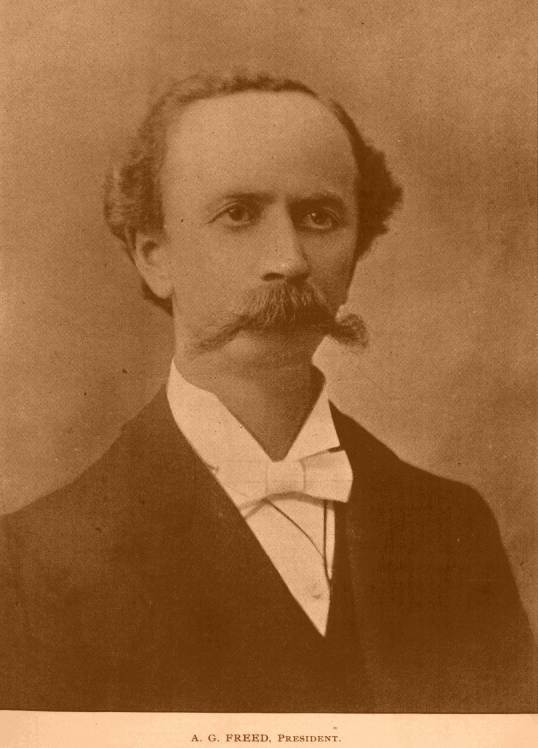
A.G. Freed, President
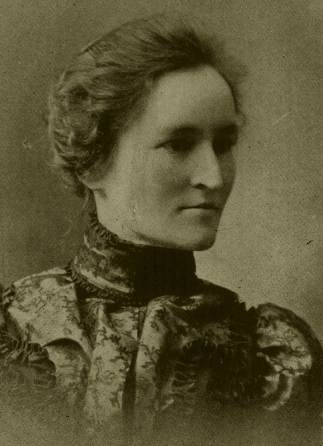
Mrs. A.G. Freed, 1901
![]()

Signature of A.G. Freed
Courtesy of Terry J. Gardner, 04.2010
Chronology Of The Life Of A.G. Freed
08.31.1847
John Freed, AGF's grandfather? died in Orange County, Indiana, BGAGF,11
05.03.1857
Joseph Freed married Eliza Ann Hays on May 3, 1857.
08.03.1863
Arvy Glenn Freed Born, August 3, in Saltillo, Indiana. Parents, Joseph and Eliza Hays Freed
1869
Henderson Masonic Male and Female Institute begins in Henderson, Tennessee. BGAGF,24
1870-1880
Became Christian, Exact date not known.
1871
Church planted in Jack's Creek, Tennessee, moved to Henderson in 1883 — BGAGF — p.76
1874
N.B. Hardeman, born in Milledgeville, TN.
1878
Instrument began to be used in worship at Henderson church. BFAGF — p.76
1879
H.G. Savage takes control of Henderson Masonic Male and Female Institute with 136 students, Henderson, Tennessee, BGAGF,24
1880
Graduated from Lawrence County High School in Mitchell, Indiana.
1883
Church moves to Henderson — BGAGF- p.76
1885
HMMFI, in Henderson, TN re-organized, new board appoints J.B. Inman, BGAGF,24
1886
AGF acquired B.S. and Master's Degree from Southern Indiana Normal in Mitchell, Indiana. BGAGF,12
1886-1888
Works two years on post-graduate work at University of Valparaiso, Indiana. Also teaches to pay for his classes. BGAGF,12,115
Spring 1888
Enrolled in Preacher's Training School at Ellettsville, Indiana. Taught by W.H. Krutsinger. AGF is one of four students (A. G. Freed, Forrest Shackelford, E. O. Barnes and A. E. Freeman GA, 05.30.1888, p.12) BGAGF13,115
Summer 1888
David S. Nelms advertises in Gospel Advocate of the need for a teacher to come run an college in Essary Springs.
GA 08.20, p.9 & 09.05, p.9 issues
Fall 1888
AGF preaches meeting in Saltilloville, Indiana, BGAGF,14
Summer 1889
Main Building at Essary Springs campus finished. AGF preaches a gospel meeting in Saltillo, Indiana. BGAGF,20
09.16.1889
Moved to Tennessee to help start Southern Tennessee Normal College in Essary Springs, Tennessee. School opened September 16. BGAGF,115
1889
In Henderson, President of HMMFI, J.B. Inman died, G.A. Lewellan, graduate of University of Kentucky, appointed president. BGAGF,24
1890
NB Hardeman enters West Tennessee Christian College, Henderson. BGAGF,28
1891
AGF preaches monthly in Middleton, TN BGAGF,115
Spring 1892
Preaches two Lord's Days and baptized 12. BGAGF,21
Summer 1892
AGF preaches in Salem, Mississippi (seven additions). Arranges for debate between M.H. Northcross and R.L. Harris. Suggests a move of school to Boliver, but failed to bring it about because of a lack of interest by the town. BGAGF,115
1893
AGF conducted services at Essary Springs, baptized 16 — BGAGF,115
1893
Enrollment at STNC reached 450, BGAGF,20
1893
In Henderson, G.A. Lewellan resigns, G.H. Duncan appointed president, BGAGF,25
02.04.1894
AGF preached for the first time for church in Henderson — BGAGF,76
08.21.1894
First debated with J.N. Hall at Corinth, Mississippi. BGAGF,65,66,69
1894
AGF preached meetings at Covington, Tennessee, and at Henderson, Tennessee that lasted 29 days.
12.1894
In an annual report in 1894, he said that for 200 days he had been engaged in the classroom. In addition, he had preached 300 times, baptized 200 people, and traveled over 5000 miles. BGAGF,22
Spring 1895
N.B. Hardeman graduates with undergraduate degree from WTCC. BGAGF,28
06.01.1895
Married one of his former students, Cora Belle Baynum. BGAGF,22
Summer 1895
AGF preached a meeting at Adamsville, Tennessee
Fall 1895
AGF moves to Henderson, Tennessee - becomes President of West Tennessee Christian College.
1896
AGF conducted a Meeting at Covington, Kentucky; Lafayette, Kentucky; Clarkesville, Tennessee; Debated a Christadelphian in Rouse Hill, Tennessee. BGAGF,116
1897
Name of school changed to Georgia Robertson Christian College. BGAGF,26
1897
Meetings at Fowlkes, Glass, and Juno, Tennessee. Debates with S.F. Cayce at Sweet Lips, Tennessee and I.N. Penick at Fowlkes. Promised one article a month to the Gospel Advocate. BGAGF,116
1897
AGF invites N.B. Hardeman to come back to school and teach while working on his M.A., Gets MA in 1899 and becomes a full-time staffer. BGAGF,29
1898
Meetings: Henderson, Rives, Roan's Creek, Tennessee. Announced to meet Ramsey Duncan in debate at Rives, Tennessee. BGAGF,116
08.10.1898
Arvy Baynham Freed is born into the Freed Home.
1899
Debated, I.N. Penick, Middleton, Tennessee, J.H. Wilburn, Kenton, Tennessee, W.H. Williams, Bradford, Tennessee, and R.H. Pigue, Bradford, Tennessee; Assisted NBH in meeting in Maury City, Tennessee; BGAGF,116
11.13.1899
Baby son, Arvy Baynham Freed, died - burial in Henderson Cemetery, 1899-1900 BGAGF,116
1899-1900
AGF preached once per month at the Obion church, sharing the pulpit with N.B. Hardeman. After leaving, they added an instrument. He offered to debate the issue, but they refused — BGAGF,77
1900
Debated P. Clark, Friendship, Tennessee; Meeting at Martin, Tennessee; Baldwin, Mississippi, BGAGF,116
1901
Debated A.A. Andrus and W.C. Berry in Palestine, Tennessee BGAGF,117 Meetings at Obion & Lexington, Tennessee; Married N.B. & Jo Hardeman BGAGF,117
04.08.1902
Second debate with J.N. Hall, Bardwell, Kentucky. Meetings: Mt. Hermon, near State Line, Kentucky. Debated R.H. Pigue at Middleton, Tennessee. BGAGF,70-73,117
Fall, 1902
The Board hires E.C. McDougle as Co-president of GRCC with AFG, BGAGF,29
Late 1902
A. M. St. John, church member, wrote E.A. Elam about coming to preach a meeting and deal with the use of the instrument. BGAGF,79
01.11.1903
Second Sunday in January when E.A. Elam begins meeting BGAGF,79
01.1903
Appointed Elder of new congregation in Henderson, Tennessee after split over instrumental music. (Freed opposed instrumental music) BGAGF,30,81
1903
Preached at Union City, Tennessee. Debates: Pigue at Troy, Penick at Gardner, Pigue at Yorkville, Clark at Hornbeak, Pigue again at Hornbeak. Stark-Warlick debate in Henderson. Establishment of Henderson church of Christ. Freed and A. M. St John chosen elders of Henderson church. BGAGF,117
Fall 1903
A meeting is held with AFG & NB Hardeman doing the preaching. BGAGF,81
Summer 1903
The property of Georgia Robertson Christian College was quietly deeded to the Tennessee State Missionary Society.” BGAGF,30
11.24.1903
The Henderson Debate with Joe Warlick and J. Carroll Stark — Sealed the separation in Henderson over the instrument.
1904
AGF promised a one month meeting in Memphis, Tennessee. Meetings: Union City, Troy, Mt. Hermon, Lewisburg, Yorkville, Tennessee. Debate at Kirksey, Kentucky. BGAGF,117
Spring 1905
AGF Resigned as President of G.R.C. College in Spring, BGAGF,30
Summer 1905
Meeting, Troy, Tennessee. Meeting at 10th Street in Nashville postponed. Preached at Finger, Tennessee. Promised to publish a book, IN Hall Unmasked. Moved to Denton, Texas. BGAGF,31,117
1906
Accepted job as President of Southwestern College in Denton, Texas
1906
President, Southwestern Christian College. Preached at Pearl Street, Denton. Commencement sermon at Joshua, Texas. Trip back to Tennessee, preached at Finger. Stricken with typhoid fever, August 15, school fared poorly. Home in Tennessee burned. BGAGF,31f,117
1907
AGF submitted his resignation for some unknown reason. BGAGF,33
03.1907
Moved back to Tennessee in March. Debated Pigue at Bogata. Meetings: Obion, Yorkville, Tennessee. Appointment at Union City.
11.07.1907
Ground breaking on new Administration Building, Henderson, BGAGF,34
1908
Opened new school in Henderson, Tennessee, National Teachers Normal And Business College, Freed and N.B. Hardeman (former student) named Co-Presidents of School. BGAGF,33f
1908
Debate announced at Maury City. Debated Penick at Toone, Pigue at Ro Ellen and Bogata. Preached at Kenton. BGAGF,117
1909-1918
AGF held numerous meetings during this period of time.
01.1910
AGF invited area preachers in West Tennessee to come to Henderson for a meeting. Very controversial. It was concerning support for evangelism in West Tennessee. BGAGF,83f,117
1910
Meeting at Cowart Street, Chattanooga, BGAGF,117
1912
Debated "Wild Bill" Evans at Burkhead Chapel, BGAGF,118
1914
T.B. Larimore moves to Henderson. Freed's meetings, Spencer's Grove, Gadsden, Tennessee. AGF debated Pigue at Marietta, Mississippi. BGAGF,118
1915
Meetings at Macon, Tennessee; Thyatira, Mississippi; Gadsden, Tennessee. BGAGF,118
1916
Meeting at Marietta, Mississippi, Macon, Tennessee. BGAGF,118
1917
Meeting at Marietta, Mississippi. BGAGF,118
1918
Meetings: Tuscumbia, Alabama, Puryear, Troy, Tennessee. BGAGF,118
1919
School sold to Board of Directors for $30,000. Name of school changed to Freed-Hardeman College. Meetings: Russell Street, Nashville, Troy, Tennessee. BGAGF,37,118
1920
Meetings: Mayfield, Kentucky, Sparta, Tennessee. Regular appointment at Rives. BGAGF,118
1921-1922
Freed served as field agent for school. Had differences with Hardeman
1921
Preached at Corinth, Mississippi. Meetings: Covington, Tennessee, Marietta, Mississippi, Old Union, Middleton, Gadsden, Henry, Ostella, Lavergne, Tennessee. Took daughter to Boston, Mass. to attend school. BGAGF,119
1922
Meetings: Avon Park and Tampa, Florida; Booneville, Mississippi; Sedalia, Kentucky; Green Plains; Near Hazel, Kentucky; Pottsville, Kentucky; and at Henry, Tennessee.
1922
Became field representative for the school. Issued challenge to debate anyone on instrumental music. Debate with J.N. Pace in Benton, Kentucky announced but not conducted. Made appeal for the church at Washington, D.C. BGAGF,119
1923
Announcement that school was out of debt. Freed announced he was severing connections with the school. Became vice-president of David Lipscomb College, principal of high school. Appointments: College church at 12th Avenue, Hartsville, Tennessee. Meeting: College church, Nashville. Debate with J.T. Banks, Old Harmony, Tennessee. BGAGF,38,119
1923
H. Leo Boles became president of David Lipscomb College, BGAGF,40
1924
Meetings: Paducah, Kentucky; Culeoka, Tennessee; Sedalia and Pottsville, Kentucky; St. Elmo, Chattanooga, Tennessee. Family reunion, Washington County, Indiana. Appointments: Foster Street, McMinnville, Tennessee; Scottsville, Kentucky; and 12th Avenue, Nashville. BGAGF,119
1924
David Lipscomb becomes a four-year school — BGAGF,40
1925
Appointments: Charlotte Avenue, Waverly Belmont, Foster Street, Russell Street, and College church, in Nashville, Tennessee; and Thomson Station, in Readyville, Tennessee.
1925
Preached commencement sermons at: Huntingdon, Cornersville, and Gainsboro, Tennessee. Meetings: Mayfield, Kentucky; Huntingdon, Hampshire, Pulaski, and Bradyville, Tennessee; Lischey Avenue, Nashville.
1925
Wrote chapter in Bible vs. Theories of Evolution. BGAGF,119.120
1926
Debated John Clark, in Nashville, Tennessee. — From 1926 he had five more debates BGAGF — p.66,91f,120
1926
N.B. Hardeman returns to F-HC as president. Stays until 1950 BGAGF,39
1926
Funeral of Walter H. Warren, Union City, Tennessee. Appointments: Chapel Avenue, Foster Street, and Charlotte Avenue, in Nashville; and at Culleoka, Tennessee; at Union Avenue, in the Tri-Cities. Meetings: Central, Jackson, Paris, Shady Grove, Little Lot, Bradyville, and Culleoka, Tennessee. BGAGF,120
1927
Debated Ben Bogard in Nashville and H.B. Taylor in Jackson, Tennessee; Meetings: Chapel Avenue. Appointments: Charlotte Avenue, Belmont. BGAGF,120
06.1927
AGF accepted the challenge to lead raising 1 million dollars for DLC over the next 10 years. The effort was not a success. He barely covered his expenses. BGAGF,41
10.06.1927
Article appears in the Gospel Advocate that Freed reconciled with N.B. Hardeman due to efforts of friends of both men. BGAGF,120
1928
Debated Ben M. Bogard in Little Rock, Arkansas. Following the debate a Baptist preacher was baptized because he said he had learned the Truth during the debate; Debates H.B. Taylor in Jackson, TN.
Writes series of articles on Christian Education for Gospel Advocate BGAGF,120
1929
Appointments: S. Columbia, Tennessee; Waverly Belmont, Pilcher Avenue, in Nashville, Tennessee. Commencement sermons: LaFayette, Tennessee; Childersburg, Alabama; and at Carthage, Tennessee.
1929
Lecture on "Establishment of the Church," at Lipscomb Lectures. Meetings: Randolph Street, Huntsville, Alabama; Fayetteville, Walter Hill, Blood River, and Earlyville, Tennessee; and at Rogersville, Alabama. BGAGF,120
1930
Appointments: Park Circle, Pilcher Avenue, and S. Columbia, Tennessee. Commencement sermons: Dechard, Tennessee and in Winfield, Alabama. Meetings: Vicksburg, and then at Corning, Mississippi; Belgreen, and at Mt. Carmel, Alabama; Rives, Tennessee; Rogersville, Alabama; and at Lindsley Avenue, in Nashville. BGAGF,120
09.30.1931
Last of seven meetings conducted by AGF. BGAGF,103
11.01.1931
Freed's Book, Sermons, Chapel Talks, and Debates published
11.11.1931
AGF died on Wednesday, Nov.11, 3pm, of cancer of the liver. In Vanderbilt Hospital, BGAGF,104 Burial followed at Woodlawn Cemetery in Nashville, Tennessee.
1975
Freed-Hardeman College Lectures - Lecture book dedication to A.G. Freed with dedication
02.1977
Lecture, "Restoration Sermons: A.G. Freed" - John Ancil Jenkins, 1977
Freed-Hardeman College Lectures
2002
Biography of a Gentleman, A.G. Freed, by John Ancil Jenkins, Hester Publications, Henderson, Tennessee c.2002.
Key: BGAGF=Biography of a Gentleman A.G. Freed, by John Ancil Jenkins, Hester Publications, c.2002
GA=Gospel Advocate
FF=Firm Foundation
Sources: John Poitevint, Senior, Freed-Hardeman College; Biography of a Gentleman A.G. Freed, by John Ancil Jenkins, Hester Publications, c.2002
![]()
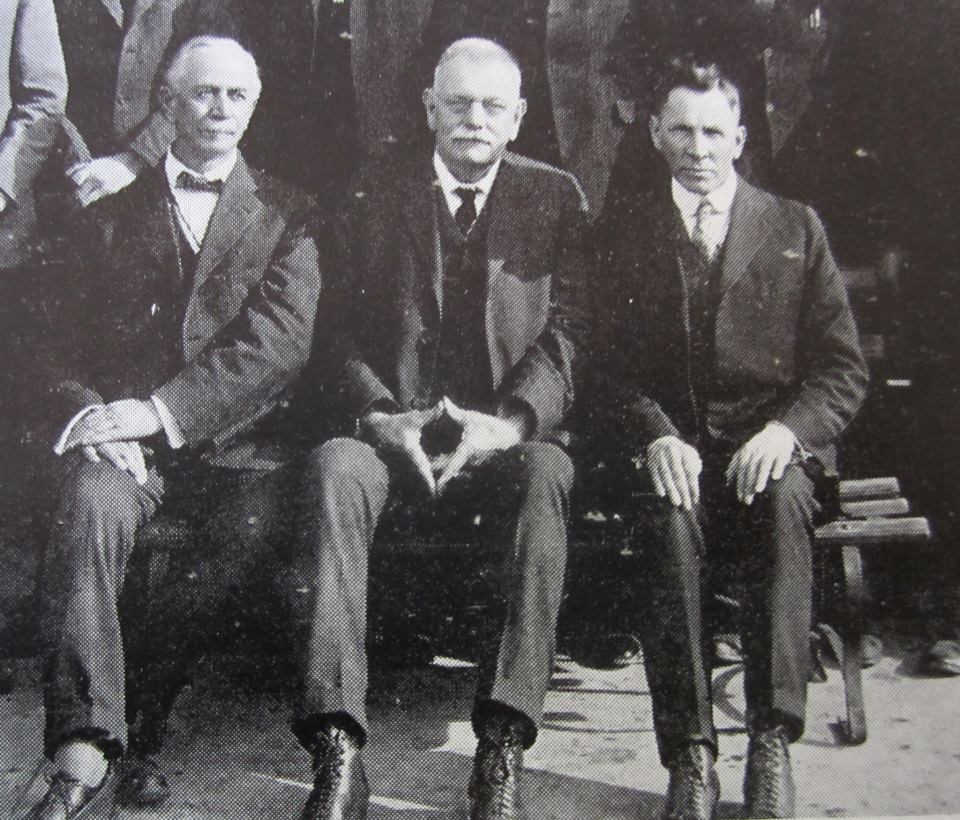
A.G. Freed, E.A. Elam, H. Leo Boles
![]()
Location Of The Grave of A.G. & Cora Freed
Directions: Woodlawn Cemetery, Nashville, Tennessee, is located behind the 100 Oaks Shopping Center that faces I-65 just south of the I-440 Interchange. From 100 Oaks travel east on Thompson Lane and turn right at the first entrance to Woodlawn's South Side Park (across from main part of cemetery). Take the first left and road will bear around to the right. Stop the car around the trashcan and look to your left. Grave is located a few rows in. See Woodlawn Cemetery Map Here.
D.d 36.110865, -86.760015
![]()

Freeds In Foreground. A. M. Burton to the left of the tree, and Mack Wayne Craig To The Right
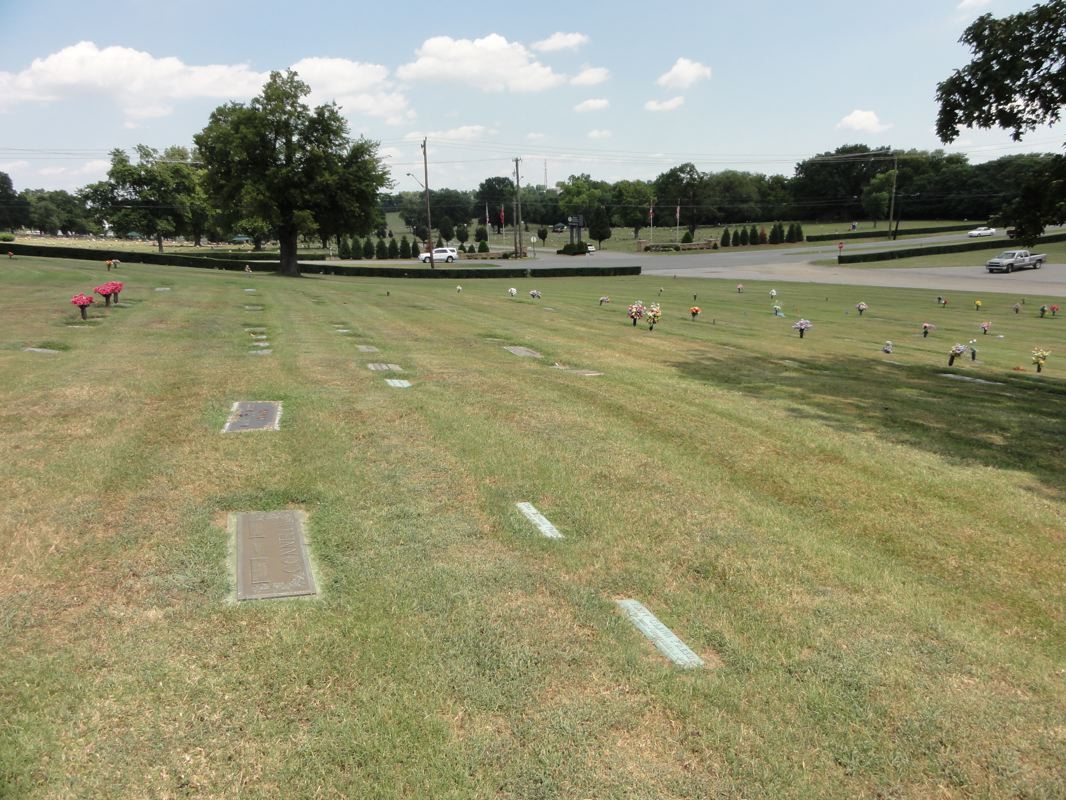
Buried in the South Lawn of Woodlawn Cemetery, the Freeds are buried within a short distance of many church leaders of the 20th Century
North Part of Cemetery Across Thompson Lane In The Distance
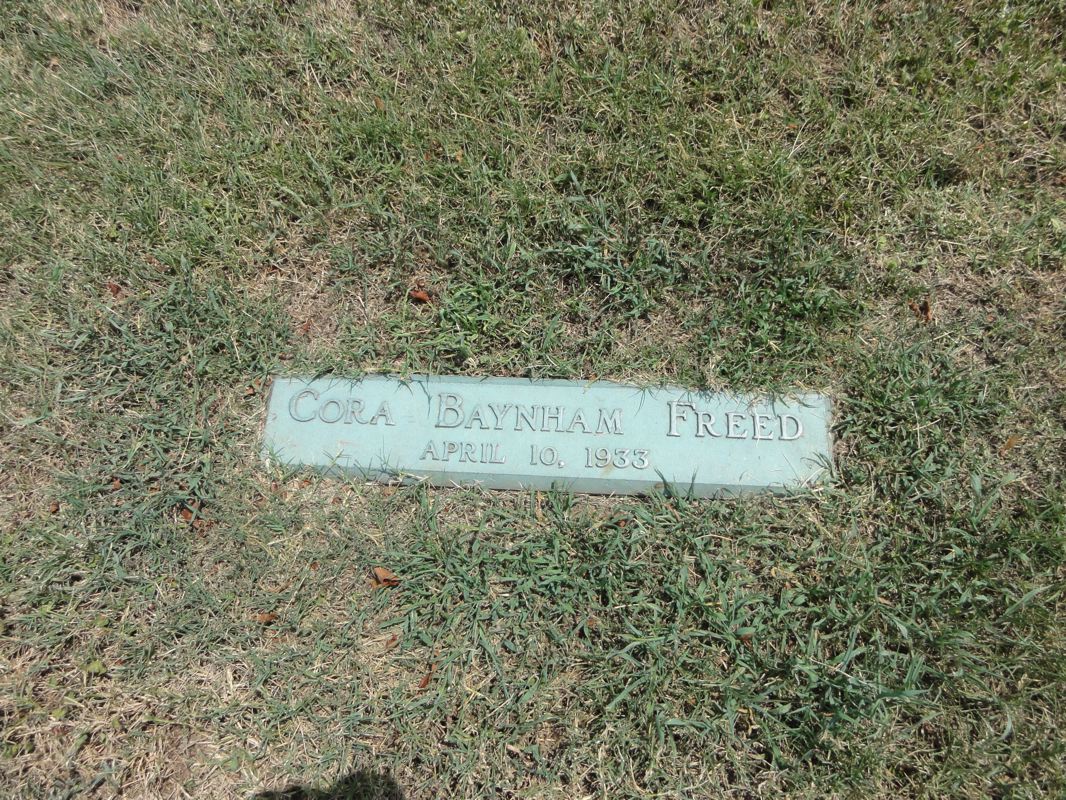
Cora Baynham Freed
April 10, 1933
Arvy Glenn Freed
August 3, 1863 - November 11, 1931
![]()
A.B. Freed, Child Buried At Henderson, Tennessee
Gospel Advocate Issue In 1931 Dedicated To A.G. Freed
![]()
